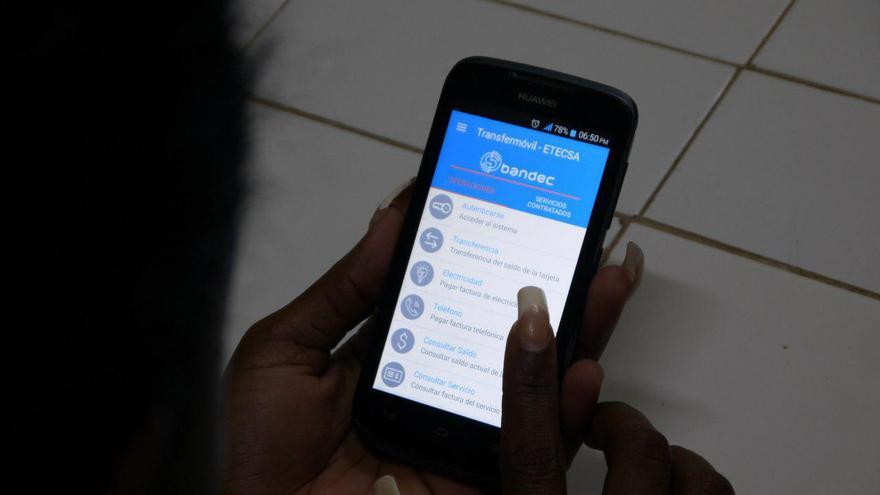
![]() 14ymedio, Havana, 15 August 2023 — As of Tuesday, August 15, Cuban banks will offer their customers a 6% discount for using electronic payment options. However, the offer will not last long, only until the 30th of this month. The vice-president of the Central Bank of Cuba (BCC), Alberto Quiñones, announced the measure on Monday in a statement on Cuban television and said customers will receive the discount regardless of the type of product or service being purchased, or the type of business, whether state-owned or private. The only requirement is that payment be done using a bank card or payment platform.
14ymedio, Havana, 15 August 2023 — As of Tuesday, August 15, Cuban banks will offer their customers a 6% discount for using electronic payment options. However, the offer will not last long, only until the 30th of this month. The vice-president of the Central Bank of Cuba (BCC), Alberto Quiñones, announced the measure on Monday in a statement on Cuban television and said customers will receive the discount regardless of the type of product or service being purchased, or the type of business, whether state-owned or private. The only requirement is that payment be done using a bank card or payment platform.
The measure is part of a program by the BCC to discourage the use cash in favor of other methods of payment. Referred to as bancarización,* the measure was approved on August 1 and took effect on August 3.
During his television interview, Quiñones discussed the problem of customers having to wait two to three hours in line at bank branches, a situation that he described as “critical.” He denied that the delays are due to the new banking measure and claimed that, on the contrary, the program is an attempt to rectify the situation by prioritizing electronic payment options.
The delays are being caused by cash withdrawals, not deposits, he said, confirming what customers already knew. For months, many of them have complained about not receiving their pensions or salaries due to a cash shortage affecting the entire country, one of the many consequences of year-over-year inflation, which official data indicates at over 45%. However, that figure does not take into account the unofficial informal market, which dominates the national economy, or the devaluation of the peso, whose exchange rate to the dollar has fallen by at least 70% since January 2022.
To deal with this situation, the Cuban government took the decision to give banking a greater role in the nation’s economy while imposing limits on customers’ cash withdrawals. “Those limits will disappear as the country’s cash situation improves,” Quiñones told the journalist Lázaro Manuel Alonso yesterday.
On Thursday, Julio Antonio Perez Alvarez, general director of Operations and Payment Systems of the BCC appeared on the television program Mesa Redonda [Roundtable] to discuss the banking measure that Quiñones and his superior, BCC president Joaquin Alonso, had already explained. Perez Alonso said that the training process for bank empoyees had already been completed though it was obvious that there was still much confusion among the public as well as in bank offices themselves.
On Monday, however, Perez Alvarez himself told the Cuban News Agency that the bank had initiated comprehensive training program aimed at bank-sector workers, the public and businesses which would lead to “the slow and gradual implementation of electronic payment systems in the country”.
He said the training, which had supposedly ended a week ago, consisted of “conferences, workshops, forums, seminars and other types of financial orientation and education” that, he claims, will benefit all institutions and governmental bodies as well as political and mass organizations at all levels.
He said that this training was intended to provide a greater awareness of the new banking measure.”
Although the government has insisted that the use of electronic payment methods is not mandatory, businesses of all types will be required to provide customers with the option to use them if they so choose. Businesses will have a six-month period in which to implement the measures by providing customers access through cell phone apps or bank cards. Those who fail to do so can be penalized by having their business licenses suspended by the Ministry of Domestic Commerce as stipulated in the statute.
Several days later the BCC’s directors asked for calm, claiming that, at least initially, businesses in sectors, such as fishing and agriculture, that lacked the necessary infrastructure would be exempt from the regtulations
*Translator’s note: An awkward term recently coined by Cuban officials that, as yet, has no English equivalent. It refers to a government effort to increase the use of digital payment options and reduce the use of cash in the Cuban economy.
____________
COLLABORATE WITH OUR WORK: The 14ymedio team is committed to practicing serious journalism that reflects Cuba’s reality in all its depth. Thank you for joining us on this long journey. We invite you to continue supporting us by becoming a member of 14ymedio now. Together we can continue transforming journalism in Cuba.
